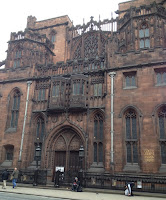This year I finally made it to the Tenby Book Fair, organised by fellow Honno author, Judith Barrow. As it was a first, I wasn’t quite sure what to expect, but it turned out to be a completely inspiring weekend in many ways, and one that will stay with me for a long time.
Tenby itself was colourful and relaxed, with long beaches and dramatic coastline, while from the window of my B&B I looked right out over Caldey Island. It was such a whirl of a weekend, it was impossible to go and explore very much, apart from wandering through the narrow streets within the medieval walls of the town, so one lesson was to make sure I go back to find out more and do plenty of exploring. I’m planning already!
 |
| Evening in Tenby Overlooking Caldey Island |
The Book Fair itself, on the first day of the Tenby Arts Festival, was busy from start to finish. There were around fifteen authors, so it was a delight to catch up with old friends and meet many new. In many ways it felt like an extension of the Novelistas, a chance to exchange ideas and experiences, and to support each other. Authors are wonderfully supportive of each other, and the buzz in the room was energising and inspiring.
 |
| With fellow Honno authors: Hilary Shepherd, Judith Barrow, Thorne Moore (right) and my wonderful editor, Janet Thomas (centre) |
Talking to the women and men who passed my stall made me fall back in love with the new book all over again. Bashing away at a novel takes so long, it’s easy to lose sight of why you thought it was a good idea in the first place. Talking to readers reminded me of the initial spark for the story, and that I was so cross the long history of the suffrage movement, and the women who fought peacefully for decades to improve the lives of women and children, has (like so much of women’s history) been pushed aside and forgotten, and overshadowed by the final, brief, violence of the suffragettes. Talking to readers helped me regain my energy, and my confidence that yes, it is a subject women find fascinating, and still resonates today.
 |
| My stall, set up and ready! |
Talking to readers and fellow writers helped restore my confidence in myself, and where I am going. And I’m already looking forward to next year in Tenby – this time proudly holding a new brand new book, hot off the press, in my hands, all ready for plenty more passionate conversations!
 |
| Tenby in the morning |








